Somma Vesuviana
Somma Vesuviana is a town and comune in the Metropolitan City of Naples, Campania, southern Italy.
Somma Vesuviana | |
|---|---|
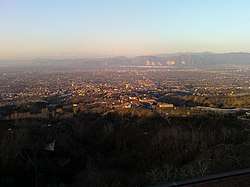 Panorama di Somma Vesuviana | |
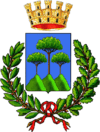 Coat of arms | |
Location of Somma Vesuviana 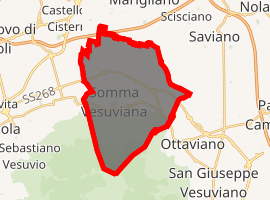
| |
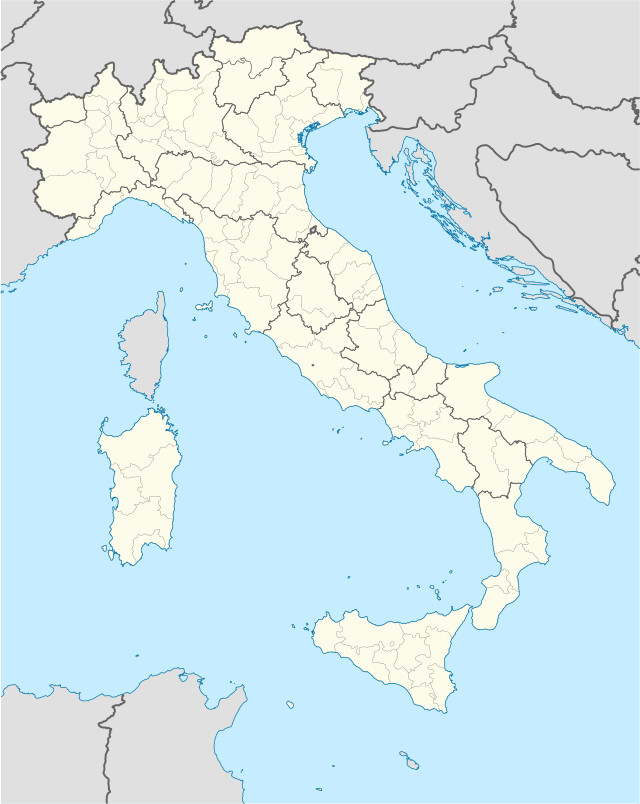 Somma Vesuviana Location of Somma Vesuviana in Italy 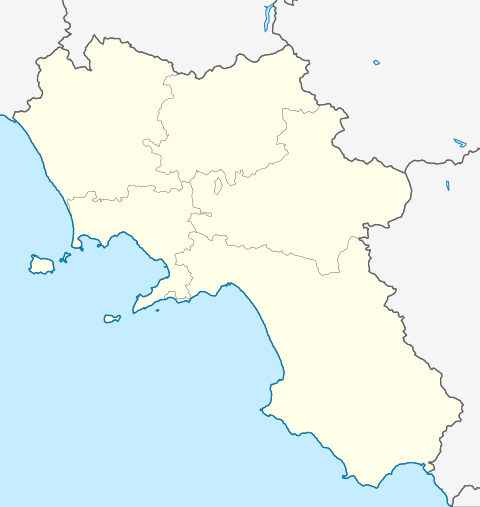 Somma Vesuviana Somma Vesuviana (Campania) | |
| Coordinates: 40°52′21″N 14°26′13″E | |
| Country | Italy |
| Region | Campania |
| Metropolitan city | Naples (NA) |
| Frazioni | Somma, Mercato Vecchio, Casamale, Rione Trieste, Santa Maria del Pozzo, Starza della Regina, San Sossio |
| Government | |
| • Mayor | Salvatore di Sarno |
| Area | |
| • Total | 30.74 km2 (11.87 sq mi) |
| Elevation | 165 m (541 ft) |
| Population (December 2017)[2] | |
| • Total | 34 981 |
| Demonym(s) | Sommesi |
| Time zone | UTC+1 (CET) |
| • Summer (DST) | UTC+2 (CEST) |
| Postal code | 80049 |
| Dialing code | 081 |
| Patron saint | St. Januarius |
| Saint day | September 19 |
| Website | Official website |
History
Before the Roman colonisation, the area of today's Somma Vesuviana was probably inhabited by Italic peoples like Samnites and Oscans.
Later it became a vacation place for the rich patricians of Rome, who built magnificent villas in the area.
A large Roman villa was discovered in the 1930s in the frazione of Starza della Regina, and interpreted as that of emperor Augustus[3] at Nola where he probably passed his last days of life.[4]
Excavation have shown that this north side of Vesuvius was equally as populated as the southern side where Pompeii and Herculaneum lie, but has not been paid as much attention by historians.
In 2002 excavations on the villa started again[5] which determined that the villa was buried during the eruption of Vesuvius of 472 AD[6] and not 79 AD (like that which buried Pompeii etc.), and so was part of the community that continued after the earlier eruption and recovered better than the territories to the south. Much of the villa has been brought to light with its rich decoration.[7]
The part excavated so far includes a monumental entrance of a vast Roman villa dating from the mid-2nd century AD. The rooms are majestic and used as audience halls for visitors.[8]
Baths of a Roman villa were also discovered in nearby Pollena Trocchia in 1988 and subsequently exposed.
Main sights
- The ancient quarter of Casamale has walls of Aragonese times.
- The Collegiata church
- Church of San Domenico
- Church of Santa Maria del Pozzo (15th century). Its cloister is home to a museum of the peasant culture of the area.
- Palazzo de Felice, a 16th-century palace and ancestral home of the de Felice family.
References
- "Superficie di Comuni Province e Regioni italiane al 9 ottobre 2011". Istat. Retrieved 16 March 2019.
- "Popolazione Residente al 1° Gennaio 2018". Istat. Retrieved 16 March 2019.
- Aoyagi, M., De Simone, A., & De Simone, G. (2018). The “Villa of Augustus” at Somma Vesuviana. In A. Marzano & G. Métraux (Eds.), The Roman Villa in the Mediterranean Basin: Late Republic to Late Antiquity (pp. 141-156). Cambridge: Cambridge University Press. doi:10.1017/9781316687147.011
- Suetonius, Augustus, 98-100
- https://www.youtube.com/watch?v=jMuvzJR3F_8
- Journal of Volcanology and Geothermal Research Volume 113, Issues 1–2, 15 March 2002, Pages 19–36, The 472 AD Pollena eruption of Somma-Vesuvius (Italy) and its environmental impact at the end of the Roman Empire
- "Apolline Project". www.apollineproject.org. Retrieved Jul 27, 2019.
- https://www.realmofhistory.com/2016/11/18/3d-animation-villa-of-augustus/
